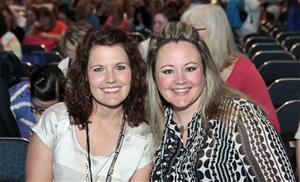 Consider the point where research meets the classroom as where the rubber meets the road. With the revamped Teaching Edge series at ILA 2015 Conference, expert researchers and practitioners will provide a map for teachers to transform their practice through academic study put into practice. The four sessions offer practical ideas for classroom buzzwords such as project-based learning (PBL), rigor, and close reading by breaking down research by academics and then reinforcing those findings through proven strategies by classroom teachers.
Consider the point where research meets the classroom as where the rubber meets the road. With the revamped Teaching Edge series at ILA 2015 Conference, expert researchers and practitioners will provide a map for teachers to transform their practice through academic study put into practice. The four sessions offer practical ideas for classroom buzzwords such as project-based learning (PBL), rigor, and close reading by breaking down research by academics and then reinforcing those findings through proven strategies by classroom teachers.
On Saturday, July 18, take a look at project-based instruction in the classroom with experts Nell Duke and Lynn Bigelman at “A Project-Based Place: Supporting Project-Based Instruction at the School Level.”
Duke is the author of several books, including Inside Information: Developing Powerful Readers and Writers of Informational Text Through Project-Based Instruction, which is copublished by ILA and Scholastic. Bigelman is the principal at a Michigan elementary school that uses PBL extensively. She trained staff in the practice when she started at a new school this year. The pair’s session will include practices that support PBL in schools.
Also on Saturday, Ruth Culham, Lester Laminack, and Kate Messner will lead a Teaching Edge session on how to help your students “steal” from authors and, in the process, learn to write.
Culham, author of The Writing Thief: Using Mentor Texts to Teach the Craft of Writing, will lead the session by the same name. During her career, Culham has perfected her method of grooming young writers through both the fiction and nonfiction they read and love. Beloved authors Laminack and Messner, who was a middle school teacher before becoming a full-time author, also encourage teachers to allow their students to steal from them. All three will be sure to share some of their favorite mentor texts as inspiration for teachers when they return to the classroom.
Culham and Messner were part of a team who discussed a similar topic during an October 2014 Google Hangout on Air, “Making the Most of Mentor Texts.” The Hangout is available on YouTube.
On Sunday, July 19, explore close reading in all genres with Lori Oczkus and Timothy Rasinski at their session, “Powerful Partners for Empowering Readers: Close Reading Workouts With Comprehension, Fluency, and Paired Texts.”
Oczkus, a classroom teacher and frequent Literacy Daily contributor, is the author of Best Ever Literacy Survival Tips: 72 Lessons You Can’t Teach WithoutandJust the Facts! Close Reading and Comprehension of Informational Text, copublished with Shell Education. Rasinski, a literacy education professor at Kent State University, is a prolific researcher who has authored more than 150 articles. His research interests include reading fluency and word study. He is a former coeditor of The Reading Teacher and is currently coeditor of the Journal of Literacy Research.
This session will share techniques for close reading, targeting informational text features and structures, methods for comparing and contrasting texts, and more.
Also on Sunday, crowd favorites Penny Kittle and Donalyn Miller will talk all about reader motivation in “Complex, Rigorous, and Social: Fostering Readerly Lives.” Learn with these authors how to empower young learners with opportunities and challenges. Kittle is the author of Book Love and founder of the Book Love Foundation that helps teachers build classroom librarians, and Miller is the author of The Book Whisperer. Kittle and Miller will hit on the motivating factors for lifelong reading: relevance, engagement, and success.
In preparation for their appearances at conference, Kittle will host the April #ILAchat on summer reading and learning, and Miller will cohost ILA’s next Google Hangout on Air, “Modeling Good Reading Habits.”
The ILA 2015 Conference will be July 18–20 in St. Louis, MO, with more than 6,000 educators ready to transform their practice. Key topics affecting literacy featured at the conference include content literacy, children’s literature, classroom engagement, and professional development. In addition to conference favorites, there will be plenty of brand new features like the Author Meetups. More than 120 exhibitors will be on hand with new tools and technologies for all manners of literacy education.
Preconference institutes, which take place on July 17, offer an all-day deep dive into topics including culturally responsive instruction and building literacy through project-based learning. You do not need to register for the full Conference & Exhibits to take part in the preconference institutes.
Learn more about the conference programs at ilaconference.org. Register today for the ILA 2015 Conference to take advantage of special Early Bird pricing.
 April Hall is editor of Literacy Daily. A journalist for about 20 years, she has specialized in education, writing and editing for newspapers, websites, and magazines.
April Hall is editor of Literacy Daily. A journalist for about 20 years, she has specialized in education, writing and editing for newspapers, websites, and magazines.